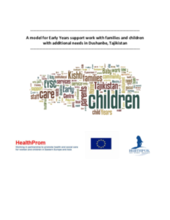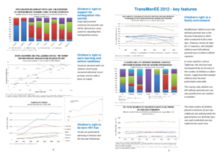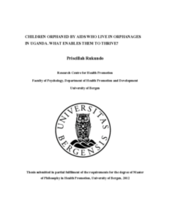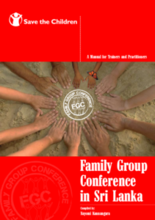Displaying 1291 - 1300 of 1510
This report is the result 4 of a two-year EU funded project “An Early Years Support Centre (EYSC) service in Dushanbe: Reducing poverty, empowering vulnerable families, strengthening partnerships and advocating for rights”. It outlines the model of support that was developed through the EYSC project in Dushanbe, the capital of Tajikistan.
TransMonEE is a database that captures a vast range of data on social and economic issues relevant to the situation and wellbeing of children, adolescents and women in 28 countries of Central and Eastern Europe, Commonwealth of Independent States and the European Union. This document includes inter-country comparisons of data on several issues related to children’s care.
The Deinstitutionalization Toolkit is designed to provide all those interested in institutional closures and expanded community living opportunities for people with intellectual disabilities and developmental disabilities (ID/DD) with information, strategies, state data, and case studies that can facilitate closure and build community capacity to serve more people with ID/DD in the community. It covers topics such as building a broad-based coalition, understanding and working within the political environment, creating a community system of care, and relevant laws, policies, and court decisions.
This study aimed at finding out what enables children orphaned by AIDS who live in orphanages to thrive.
This article provides an update on a series of projects that have highlighted the issue of institutionalization of children in Europe, arguing that babies and small children aged less than 3 years old, with or without disability, should not be placed in residential care without a parent or primary caregiver.
This manual, produced by Save the Children in Sri Lanka, provides guidance on Family Group Conferencing (FGC), which was introduced to the governmental childcare structure in Sri Lanka's Southern Providnce between 2006-2008. Th
Utilizing the United Nations Convention on the Rights of the Child and the Guidelines for the Alternative Care of Children, this paper from Monographs of the Society for Research in Child Development Volume 76, Issue 4 examines critical components and current characteristics of alternative care for children in low‐resource countries.
Children within institutional care settings experience significant global growth suppression, which is more profound in children with a higher baseline risk of growth impairment (e.g., low birth weight [LBW] infants and children exposed to alcohol in utero), according to this chapter from Monographs of the Society for Research in Child Development Volume 76, Issue 4.
This monograph reviews literature pertaining to children without permanent parents.
This paper from Monographs of the Society for Research in Child Development Volume 76, Issue 4 proposes a number of key components for translating research into policy and programs: analyzing the situation, using evidence to build the case for action, developing policies, building program capacity in child welfare and early childhood development, creating a family‐based child welfare system, and developing a system of monitoring and accountability.




